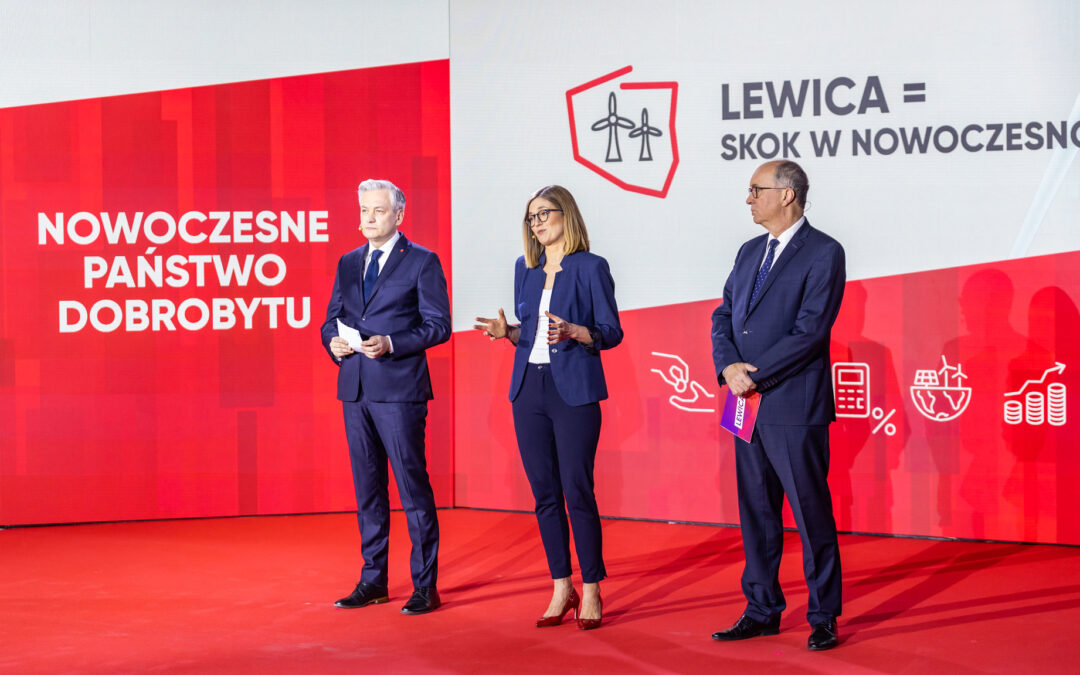Poland’s main left-wing opposition group has presented plans to build hundreds of thousands of social housing units, to increase financing for childcare and energy transformation, as well as to end the rule-of-law dispute with Brussels that has frozen billions of euros in EU funds.
The plans, outlined at a party conference on Sunday, come ahead of this autumn’s parliamentary elections, at which The Left (Lewica) and other opposition parties are hoping to together oust the ruling national-conservative Law and Justice (PiS) party.
Czas na podsumowanie Konwencji – Niska Inflacja #SprawiedliwaGospodarka ⤵️ pic.twitter.com/37ktYsQS0x
— Marcin Kulasek (@MarcinKulasek) April 2, 2023
With Poland facing a housing crisis, the two main parties – PiS and centrist opposition Civic Platform (PO) – have both proposed plans to subsidise mortgages for first-time buyers.
However, The Left argues that boosting demand in this way without addressing the shortage of housing will simply drive up prices further. It instead wants to build 300,000 social housing units over the next four-year parliamentary term that would be available to “not only the lowest earners but also the middle class”.
“The time when the state encourages people to take out even more loans for even more expensive housing is over,” said Magdalena Biejat, one of The Left’s leaders, yesterday, quoted by financial news service Money.pl.
“We will implement this in close cooperation with local authorities on the principle: the state pays, local authorities build rental housing,” she said. For this purpose, The Left wants to set up a dedicated housing ministry.
The programme – which The Left says would be the biggest of its kind in Poland’s post-communist history – would require increasing budget allocations for construction from the current 1.5 billion zlotys (€320 million) to 10 billion zlotys (€2.1 billion) from 2024.
Prices for both buying and renting in Poland have soared, leaving many struggling to afford housing.
But solutions proposed by the two main parties – to subsidies mortgages – repeat demand-side solutions that have failed in the past, writes @WojciechKosc https://t.co/I0DUlOEn2h
— Notes from Poland 🇵🇱 (@notesfrompoland) March 31, 2023
At its conference, Lewica also sought to set itself apart from opposition rival PO with regard to social spending by outlining plans to boost state financing for childcare.
“To encourage young couples to have children, the state must be supportive,” said Robert Biedroń, another of the group’s leaders, adding that the PiS’s government’s flagship programme of providing parents with 500 zloty per month per child “is OK, but not enough”.
“The state must provide free childcare when mothers return to work,” he added, contrasting this to PO’s recently unveiled plan to give mothers who return to work after maternity leave 1,500 zloty per month. PO named the idea “granny payments” because grandmothers often care for children when mothers return to power.
“Instead of ‘granny payments’ there should be ‘nursery payments’, thanks to which 1,000 new daycare facilities should be created each year,” said Biedroń. The PiS government also recently pledged to create more nursery places.
Mothers who return to work after maternity leave would get 1500zl (€320) a month from the state under a policy proposed by Poland’s main opposition party
They call the idea “granny payments” because grandmothers often care for children while mothers work https://t.co/wGW9tV2nz6
— Notes from Poland 🇵🇱 (@notesfrompoland) March 24, 2023
Another of the group’s leaders, Włodzimierz Czarzasty declared yesterday that “The Left knows well how to unblock” the Polish EU funds currently frozen due to the European Commission’s concerns over judicial independence – although he did not outline how.
Once these funds are unlocked, they could be spent in particular on supporting Poland’s green transition, “unleashing the energy of Poles who want to invest in their home renewable energy sources”, said Czarzasty. “A stable economy must be based on stable energy sources.”
The Left also proposes a 20% pay rise for public sector workers, such as teachers; 22 billion zloty to support small businesses; 5.5 billion zloty on carbon-neutral means of transportation and renewables; spending 2% of GDP on research and development projects; and 10 billion zloty for hospital modernisation.
“We are putting our demands on the table today for the entire opposition,” said Biedroń, who called for talks with other parties on further cooperation, as well as the signing of a minimum program agreement before the elections.
Polling currently indicates that, if the opposition wants to replace PiS in power after the elections, it will need to form a broad coalition government ranging from centre-right to left.
The contrasting reactions of Poland's opposition parties to claims that Pope John Paul II knew of child sex abuse highlight differences that may help them win power at this year's elections but will make it harder for them to govern, writes @danieltilles1 https://t.co/NjbAxqtbVB
— Notes from Poland 🇵🇱 (@notesfrompoland) March 15, 2023
Main image credit:

Alicja Ptak is deputy editor-in-chief of Notes from Poland and a multimedia journalist. She has written for Clean Energy Wire and The Times, and she hosts her own podcast, The Warsaw Wire, on Poland’s economy and energy sector. She previously worked for Reuters.




















